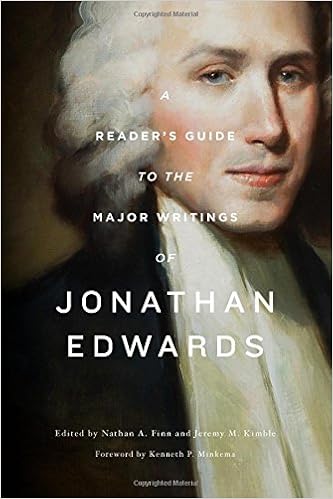
A Reader’s Guide to the Major
Writings of Jonathan Edwards
Edited by Nathan A. Finn and Jeremy
M. Kimble
This
collection of essays edited by Finn and Kimble draws together some of the
finest Edwards scholars around and delves into the deep parameters of Edwards’
thought. From his theology, ethics, and
revivalist writings, by reading these chapters one can get a sure grasp on this
greater thinker and pastor of the Christian faith. Much like having sturdy handrails as you
ascend and descend the heights and depth of a trail, these authors give us
literary and theological handholds to understand and guide us as we read the
voluminous work of Jonathan Edwards.
What can at first light be an immense and daunting task, with help from
this team of Edwards experts the believer can navigate the work of Edwards with
confidence.
I really got
to see a vision of the importance of the writing of Jonathan Edwards in the first
chapter on how to read Edwards by Dane Ortlund.
Getting to the heart of the matter, Dane writes, “But Jonathan Edwards
lived and saw and preached and penned a vision of God and of walking with him
that will be foreign to someone who has not begun to taste the same thing. He
exhaled the air of eternity. When you read Jonathan Edwards as an unbeliever,
you find yourself bewildered, perhaps even amused. When you read him as a
believer, you find yourself enjoying the scent of something high and deep and
beautiful that is beyond you, to which you are irresistibly drawn but find
yourself unable to contain or domesticate (26).” There is high and lofty vision in the words
of Edwards about the God of the Universe as Creator and Redeemer. Yet, as Dane points out, Edwards never saw
God in the light of an enclosed study but lived and preached this vision of
God, his faith was as vibrant as ever.
There really was no other profession than the ministry that Edwards
could apply his hand at, for his aim was shepherding souls and in doing so he
was a ‘miner of the Word of God’ (28). This first chapter paints the picture of
Edwards as lover of God, his Word, and the gospel in a marvelous and deep way.
My favorite
work of Edwards that brings delight when I read it again is his Religious
Affections. Scholar Gerald McDermott
delves into this work with a razor sharp focus on the nuances of Edwards’
thought. One misunderstood aspect of his
thought was his understanding of what ‘affections’ are and how they are
different than emotions. McDermott
writes, Both sides then, and many scholars since, have wrongly assumed that
Edwards’s affections are the same thing as “emotions.” But emotions for Edwards
are only one dimension of human experience shaped by affections, along with
thinking and choosing. Furthermore, Edwards always links affections to an
object, while emotions may or may not have an object (99).” For Edwards, affections certainly included
the mind and will, but emotions are only part of the story. The affections always have an object, a
person, an end purpose for which arise.
Emotions are prone to volatility and often are not in keeping with the
things of God. Another aspect of
McDermott’s chapter is his focus on positive signs of true religion. Concerning the chief article of true
religion, Christian behavior, McDermott writes, “He wrote eighty pages on this
sign, more than four times as many as for any of the other signs. Practice does
not mean perfection but commitment over time to the lordship of Christ. What
someone does in her life is finally more illustrative of grace than what she
says (106).” Edwards was so concerned
that one’s life be an overflow of the divine grace given in salvation, he did
not want there to be an end to the way one lived in praise and thanksgiving for
the mighty work that God did to save wretched sinners.
The
remaining chapters in this book are worth the effort to read and digest as
well. Crossway has put together a
wonderful collection of faithful men to write about one of the finest believers
and writers of the Christian faith.
Thanks to
Crossway Publishers for the review copy of this book in exchange for an honest
review.
Comments
Post a Comment